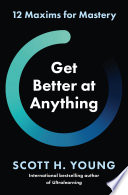

Deliberate practice is the cornerstone of acquiring mastery in any field. The author emphasizes that mere repetition of tasks does not lead to improvement. Instead, one must engage in focused practice that targets specific areas of weakness. This involves setting specific goals, seeking feedback, and pushing beyond one's comfort zone. The book outlines methods to create a deliberate practice routine, which includes breaking down skills into manageable parts and consistently practicing them with the intent to improve. The importance of reflection after practice sessions is also highlighted, as it allows individuals to assess their performance and make adjustments for future practices.
Continue readingThe book underscores the significance of having a growth mindset, a concept popularized by psychologist Carol Dweck. A growth mindset is the belief that abilities can be developed through dedication and hard work. This contrasts with a fixed mindset, where individuals believe their talents are innate and unchangeable. The author provides strategies to cultivate a growth mindset, such as embracing challenges, learning from criticism, and celebrating the success of others. By fostering this mindset, individuals can approach mastery with resilience and a willingness to learn from failures, ultimately leading to greater success in their pursuits.
Continue readingSetting clear and measurable goals is essential for mastering any skill. The author discusses the importance of defining both short-term and long-term goals, as well as the need to track progress towards these objectives. This process not only provides motivation but also helps in maintaining focus on what truly matters. The book introduces various goal-setting frameworks, such as SMART (Specific, Measurable, Achievable, Relevant, Time-bound) goals, and emphasizes the need for regular reviews to adjust goals as needed. By systematically tracking progress, individuals can identify patterns, celebrate milestones, and stay committed to their path of mastery.
Continue readingFeedback is a crucial element in the journey towards mastery. The author explains that constructive feedback helps individuals understand their strengths and areas for improvement. The book offers strategies for seeking out feedback from various sources, including peers, mentors, and self-assessment. It also discusses the importance of being open to criticism and using it as a tool for growth rather than a source of discouragement. By actively seeking and effectively utilizing feedback, individuals can make informed decisions about their practice and development, leading to accelerated improvement.
Continue readingCreating an environment that fosters growth and learning is vital for achieving mastery. The author discusses how surrounding oneself with supportive individuals, such as mentors, peers, and coaches, can significantly enhance the learning process. Additionally, the book highlights the importance of minimizing distractions and creating a dedicated space for practice. This supportive environment not only encourages accountability but also provides motivation and inspiration. The author shares tips on how to cultivate such an environment, emphasizing the need for collaboration and positive reinforcement.
Continue readingThe journey to mastery is often fraught with challenges and setbacks. The author emphasizes the need for resilience and persistence in overcoming obstacles. This involves developing coping strategies to deal with failures and maintaining a positive outlook despite difficulties. The book provides anecdotes and examples of successful individuals who faced significant challenges but persevered through them. By cultivating resilience, individuals can sustain their efforts in the face of adversity, ultimately leading to greater achievements in their mastery journey.
Continue readingMastery is not a destination but a continuous journey of learning and growth. The author encourages readers to adopt a mindset of lifelong learning, where they remain curious and open to new experiences and knowledge. This involves seeking out new challenges, exploring different fields, and continually expanding one's skill set. The book discusses the importance of staying updated with industry trends and innovations, as well as the role of self-directed learning in personal and professional development. By embracing lifelong learning, individuals can adapt to changes and maintain relevance in their chosen fields.
Continue readingThe reading time for Get Better at Anything: 12 Maxims for Mastery depends on the reader's pace. However, this concise book summary covers the 7 key ideas from Get Better at Anything: 12 Maxims for Mastery, allowing you to quickly understand the main concepts, insights, and practical applications in around 21 min.
Get Better at Anything: 12 Maxims for Mastery is definitely worth reading. The book covers essential topics including Deliberate Practice, Mindset Matters, Goal Setting and Tracking Progress, providing practical insights and actionable advice. Whether you read the full book or our concise summary, Get Better at Anything: 12 Maxims for Mastery delivers valuable knowledge that can help you improve your understanding and apply these concepts in your personal or professional life.
Get Better at Anything: 12 Maxims for Mastery was written by Scott H. Young.
If you enjoyed Get Better at Anything: 12 Maxims for Mastery by Scott H. Young and want to explore similar topics or deepen your understanding, we highly recommend these related book summaries:
These books cover related themes, complementary concepts, and will help you build upon the knowledge gained from Get Better at Anything: 12 Maxims for Mastery. Each of these summaries provides concise insights that can further enhance your understanding and practical application of the ideas presented in Get Better at Anything: 12 Maxims for Mastery.